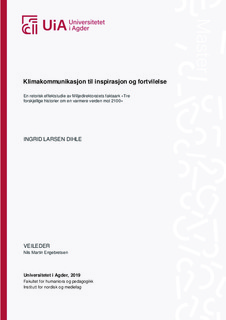| dc.description.abstract | This study includes a rhetorical analysis of the Norwegian Environment Agency’s fact sheet “Three different stories of a warmer world towards 2100,” and revealshow it affects a selection of the target audiences. The fact sheet is based on a text from the Intergovernmental Panel on Climate Change (IPCC) report: “Global Warming of 1,5 °C”. The fact sheet is written as three stories, presenting different scenarios of what might happened to the world in the future, asa consequence of global warming. The research question of this study askes what rhetorical strategies the Norwegian Environment Agency use in the fact sheet to influence the readers, and how it affects a selection of the target audience. To answer the research question, this study includes a rhetorical analysis of the fact sheet. To reveal the authors’purpose and process behind the publishing of the fact sheet, this study contains an expert-interview of representatives from the Norwegian Environment Agency. To discover how a selection ofthe target audiences were affected by the document, two focus groups were arranged. One of the groups consisted of students from the University of Agder, the other group consisted of people over the age of 50 years. In the discussion of the method findings, this study includes theory from social psychology and cognitive perspectives, to debate how and why the participants were affected differently. The results from thisstudy revealed that the rhetorical strategies implemented in the fact sheet were impactful. The texts are based on international research assembled by IPCC, which strengthens the credibility of the statements in the texts. The dramaturgical development and strategical order of the scenarios contribute to strengthen the pathos-effect, influencingthe reader to be mostly affected by the last and most dramatic scenario. The effect of the fact sheet varied between the focus group participants. These variations were based on their generation, and earlier commitment to the climate issue. Thisstudy concludes that even though the fact sheet affected the participants, they all felt a certain powerlessness as individuals to be able to make a significant difference on the global warming issue. Others experienced increased motivation for action. Furthermore, the fact sheet triggered a general consensus that the issue demands political governance, and an overall change in society to reverse climate change. | nb_NO |

